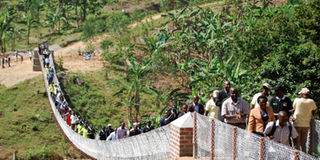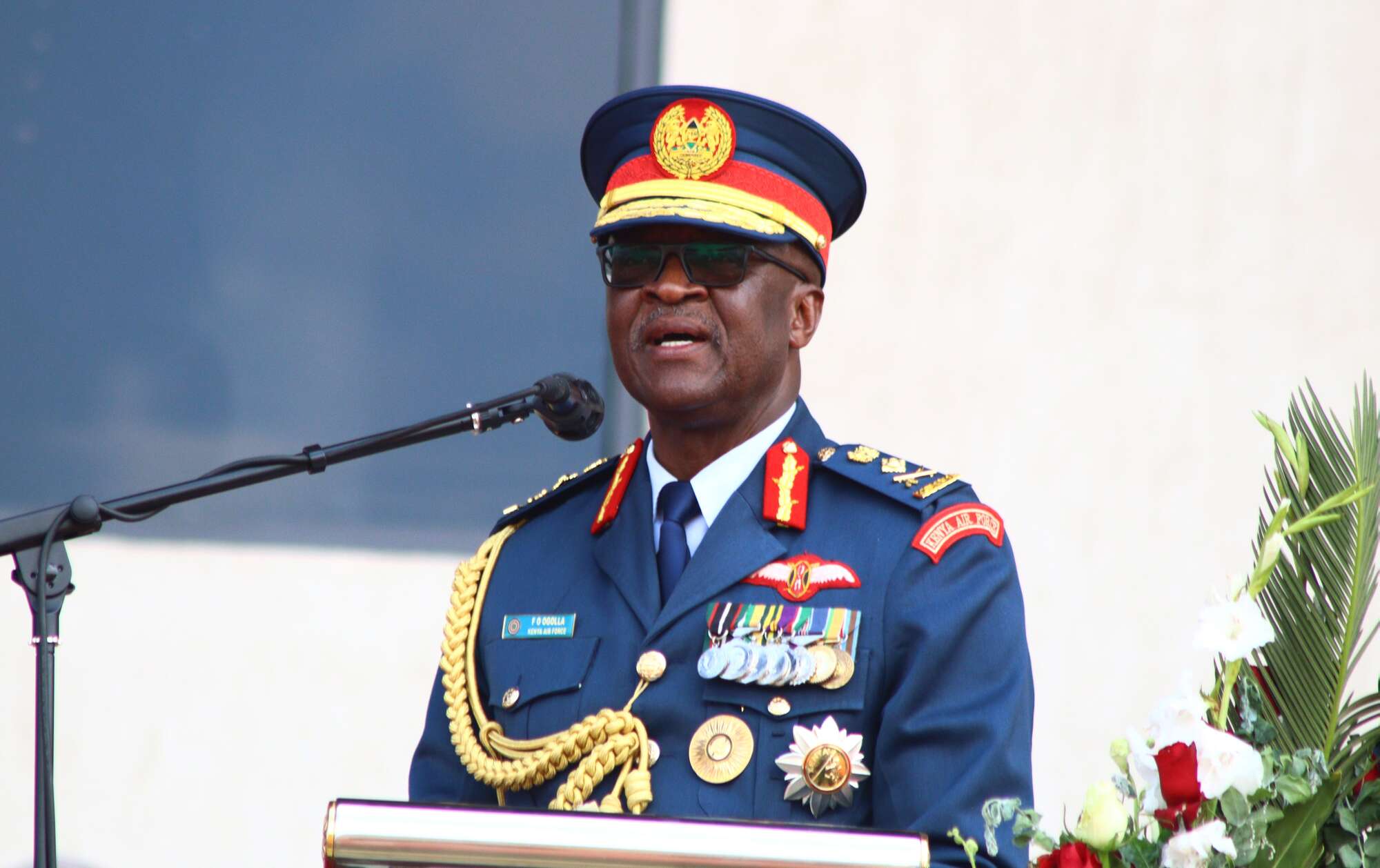Sigh of relief as new bridge links Mbale locals to services

Transport. The Minister of Works and Transport, Ms Monica Azuba Ntege [wearing brown blouse] commissions suspended cable foot bridge in Mbale District last week. Photo by Mudangha Kolyangha
What you need to know:
- Conducive. According to residents, the bridge has made it easier for them to access nearby services, even in harsh weather conditions which was not the case before.
- This area is more complicated to an extent that roads become impassable during rainy season and the timber made bridges are washed away, cutting off transport. This has been a challenge but with the establishment of a suspended bridge in this hilly area, residents are now able to access services. It has been hard for pupils to access education,” James Shilaku, Mbale Resident District Commissioner
Mbale. For residents of Bunyafu Sub-county in Sironko District, Christmas came early following the construction of a suspended bridge after years of facing challenges of accessing social services in the neighbouring sub-counties in Mbale District.
The 90-metre bridge, constructed by Bridges to Prosperity (B2P), a US-based NGO in partnership with the government at Shs250m, breathes a sigh of relief, especially to mothers and children who have been struggling to access health centres and primary schools in Bufumbo Sub-county.
Ms Norah Nekesa, 73, one of the residents, says they have been using a makeshift bridge to crossover to the neighbouring sub-counties.
“We had difficulties to cross to other areas, especially during the rainy season. The bridge was always washed away,” Ms Nekesa says, adding that whenever that happened, it could take months for the timber-made bridge to be reinstated.
“We have been going through misery because when it is washed away, our children stay at home because we cannot risk their lives to attempt crossing over until it is worked on by the community members,” she says.
Ms Suzan Nambozo, another resident, says they have also been facing challenges of reaching Bufumbo Health Centre IV since Budadiri Health Centre IV in Sironko District is far away from their area.
“It has been a struggle to access healthcare. We have also been having challenges of fetching water for domestic use from the neighbouring villages,” Ms Nambozo says.
She adds that they are happy government has intervened and constructed a bridge that cannot be affected by weather hazards.
The construction of the suspended bridge, which was a pilot project, started in September.
It was launched last Tuesday by the Works and Transport minister, Ms Monica Azuba Ntege, at the site in Kama Village, Bukonde Sub-county.
The village chairperson, Mr Mohammed Masaba, says before the bridge was constructed, there were many reported cases of drowning.
“We had suffered a lot but this is no longer happening. This bridge is safe and secure compared to the locally made ones,” he says.
Mr Masaba urges government to construct more cable bridges in the mountainous areas to ease transport.
“Most communities in mountainous areas face accessibility challenges. This type of bridge will help us transport our goods to markets,” he says.
The Bufumbo Sub-county LC3 chairperson, Mr Yusuf Wakholi, says most parts in Bugisu Sub-region are inaccessible.
“We believe if such type of bridges are constructed, we will have safe pedestrian access,” Mr Wakholi says.
The Mbale Resident District Commissioner, Mr James Shilaku, says government should allocate more resources to the construction of cable bridges.
Ms Erica Brandt, the programme manager of Suspended Cable Foot Bridge in Uganda, says the organisation carried out feasibility studies and discovered that Uganda had challenges in rural areas, where communities find more difficulties to cross to other areas due to the terrain.
“The situation is complicated during rainy season when communities in hilly areas face challenges of accessing education, health and transporting goods to the markets after linkages have been washed away or destroyed,” Ms Brandt says.
Ms Azuba says government will embark on the construction of more 10 suspended cable foot bridges across the country at Shs2.5 billion.
“The government is committed to continue constructing such structures even after the B2P programme has ended,” Ms Azuba says, adding that construction of the bridges will also boost tourism.
She adds that availability of cable bridges will also speed up government’s strategic plans of attaining middle income status by 2020.
“With the improved infrastructure in hard-to-reach areas, there will be an enhanced access to markets, health centres, schools, administration offices and other social amenities. This, therefore, will solve some of the development bottlenecks,” the minister says.
She says cable bridges are cost effective and environmentally friendly compared to conventional bridges, which cost more than Shs3b to construct.




